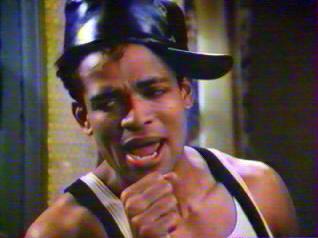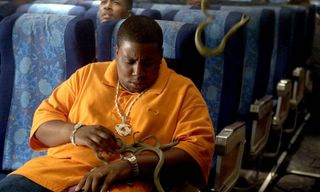That's not to say that Olivia's friends are blameless. Uber-rich stay-at-home Mom Franny (Joan Cusack) offers to pay for her friend's psychotherapy bills, but not for Olivia to take classes to become a personal trainer. Chronic depressive Jane (Frances McDormand) barely hides the contempt and pity she feels for any peer forced to clean houses for a living, and constantly urges Olivia to go back to teaching. Finally, screenwriter friend Christine distracts herself from the crisis of a failed marriage to a mean-tempered bully (Jason Isaacs) by tearing down everyone she knows, whether they are there to defend themelves or not.
These pathetic, miserable creatures populate Nicole Holofcener's unfortunate Friends With Money, an 85 minute ode to projection in all of its forms. Holofcener, whose previous film Walking and Talking was similarly thin but at least more entertaining, starts off with what could otherwise be an interesting central conceit and then hammers at it crudely until her point becomes painfully, abundantly clear. Yes, everyone is willing to forgive their own flaws even as they ceaselessly dissect, judge and criticize the behavior of everyone else. Yes, we focus on the problems of our friends and family as a way of ignoring our own. Yes, we get so caught up in our own perspective sometimes that it's impossible to see simple, straightforward problems clearly.
So the fuck what?

Holofcener has a lot going for her as a writer/director. She writes funny dialogue, which is a huge huge plus right from the start. Most American movies have at least servicable plots, but very few manage to tell stories with any kind of flair for language or panache. Friends With Money is repetitive and ultimately shallow, but it does feature a bevy of actresses who know how to make the most from a well-turned phrase. Some of the film's best moments are little side jokes, wry comments made under the breath that don't really have anything to do with a given scene.
(Christine, for example, while browsing the auction items at the ALS fundraiser, notes that, for a price, Reese Witherspoon will knit you a sweater. "I wonder how long that would take?," Keener muses in her patented deadpan.)
Regrettably, this kind of low-key charm can only get Friends With Money so far. Holofcener so relentlessly hits her main overarching theme, that her characters are blind to the real issues that are ruining their lives, everything gets locked into place very early on in the film. Actresses like Frances McDormand and Catherine Keener are more than capable of moving beyond simple types and fleshing out fully-realized characters, but in Friends With Money, they are struggling against a strong undertow of bland, obvious predictability.
In the office where Christine and her husband David agonize over their own script, the walls are lined with bulletin boards on which colored index cards keep all the various plot threads organized. I can almost imagine Holofcener sitting in a similar room, sifting through 3x5 cards on which she has recorded the two-word phrase that summarizes each of her characters.
Franny: Bored elitist
Jane: Bitter depressive
Olivia: Frustrated dreamer
Christine: Cynical victim
Whenever in doubt, Nicole returns to her index card. This is probably why Frances McDormand inserts "I'm tired" reflexively into nearly every conversation. Because she's depressed, you see.
This unfortunate tendency isn't limited to the female characters. All the men in their lives are the same way. To wit:
Franny's husband Matt (Greg Germann): Well-meaning goober
Jane's husband Aaron (Simon McBurny): Repressed homosexual
Christine's husband David: Narcissistic bully
Olivia's boyfriend Mike (Scott Caan): Goofy shitheel
Olivia's boyfriend Marty (Bob Stephenson): Sensitive loner
I shouldn't be able to summarize a film's entire cast so succinctly and yet so accurately. Watching Friends With Money is like solving a 20 piece jigsaw puzzle - stress-free and maybe enjoyable for a few minutes but boring and easy and ultimately pointless. There's not a lot of intellectual or emotional heavy-lifting involved.
Everything's there in the title, albeit indirectly. Though the film centers largely on Olivia's perspective, it's not called Life Without Money or Relative Poverty. It's Friends With Money. It's not about living in modern Los Angeles on a maid's salary, but about how obsessing over how much her friends have and what they do and how they live has distracted Olivia from the real business of living her life. It takes her the entire length of the film to even realize that aimless pessimism might be making her unhappy because she has spent so much time resenting her wealthy friends and wondering if her friend Jane's husband might be gay.
Counterintuitively, Friends With Money isn't really about friendship, having money or not having money. The class divide in LA is the content of the film but not the subject. Because, let's face it, Olivia's is a low-grade form of poverty. She doesn't worry about paying the rent or buying groceries. She doesn't have a mortgage or children to care for or ailing parents. She stresses over having enough of her favorite kind of skin cream, over paying for dinners when she goes out with friends, over sharing her housekeeping earnings with her boyfriend even though all he does in the house is hang out and have sex with her. Anyone who thinks this represents actual poverty in America has a fairly sheltered perspective.
The resolution of Olivia's storyline, however, crosses the line between merely shallow and downright offensive. [NOTE: I will now discuss the ending of Friends With Money. If you don't want to know what happens in the last few scenes, stop reading now.]
After an entire film in which she tries to figure herself out - Does she want to be a personal trainer? Does money really matter to her so much? Why are all her friends married while she's still single? - Olivia just lucks out in meeting a rich and available man who then buys her stuff and takes care of her. I honestly can't believe a woman wrote and directed this story in 2006. It's exactly the way I'd imagine some chauvanistic former fratboy would conclude a story about a charming but conflicted girl bumbling her way through her 30's. "Well, she's screwed up for a while, but then she just stops being uptight and makes herself look nice and meets a rich guy who makes her all better." Yeesh.
This is the worst example, but really, every scene in Friends With Money had at least one moment I found cloying or obvious or overly simplistic. Christine and David are building a garish second story on to their already-large home, which understandably irks their neighbors. But it isn't until Christine actually goes next door and sees how the extension is blocking the view that she realizes the depth of her insensitivity. See? She never noticed that her house was such an eyesore because she's always inside her own house! As metaphors go...it's not exactly the most subtle or intricately developed...






